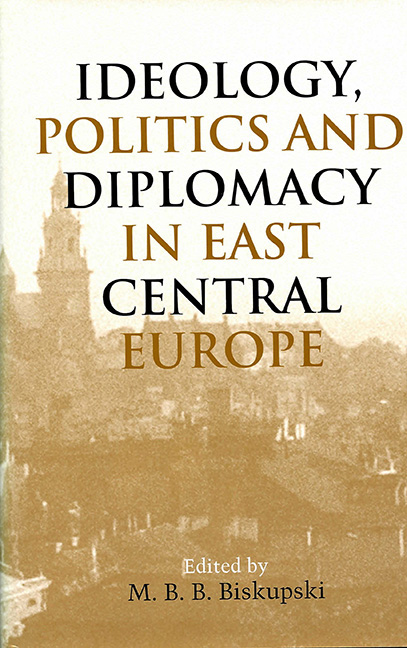Book contents
- Frontmatter
- Contents
- Preface
- Tabula Honoraria
- Piotr Wandycz
- Piotr Wandycz: An Appreciation
- 1 A Comparison of Czech Politics in Bohemia with Czech Politics in Moravia, 1860–1914
- 2 Strategy, Politics, and Suffering: The Wartime Relief of Belgium, Serbia, and Poland, 1914–1918
- 3 “This Troublesome Question”: The United States and the “Polish Pogroms” of 1918–1919
- 4 The Socialist Imprint on International Relations in Interwar Europe
- 5 Hungarian Americans during World War II: Their Role in Defending Hungary's Interests
- 6 The Nazi-Soviet Pact of August 23, 1939: When Did Stalin Decide to Align with Hitler, and Was Poland the Culprit?
- 7 Poland, the GDR, and the “Ulbricht Doctrine”
- Writings of Piotr S. Wandycz
- Contributors
- Index
3 - “This Troublesome Question”: The United States and the “Polish Pogroms” of 1918–1919
Published online by Cambridge University Press: 11 May 2017
- Frontmatter
- Contents
- Preface
- Tabula Honoraria
- Piotr Wandycz
- Piotr Wandycz: An Appreciation
- 1 A Comparison of Czech Politics in Bohemia with Czech Politics in Moravia, 1860–1914
- 2 Strategy, Politics, and Suffering: The Wartime Relief of Belgium, Serbia, and Poland, 1914–1918
- 3 “This Troublesome Question”: The United States and the “Polish Pogroms” of 1918–1919
- 4 The Socialist Imprint on International Relations in Interwar Europe
- 5 Hungarian Americans during World War II: Their Role in Defending Hungary's Interests
- 6 The Nazi-Soviet Pact of August 23, 1939: When Did Stalin Decide to Align with Hitler, and Was Poland the Culprit?
- 7 Poland, the GDR, and the “Ulbricht Doctrine”
- Writings of Piotr S. Wandycz
- Contributors
- Index
Summary
On April 10 a news dispatch appeared that fifty Jews had been lined up against a wall and executed by command of a Major in the Polish Army. A great outcry broke out in the American press. Paderewski was in Paris and I suggested that he should have an investigation made at once. In the meantime, we sent one of our staff to investigate and found there was really not much truth in the story. But it still raged in the American press and began to threaten our relief work. On June 2nd I wrote President Wilson suggesting that with Paderewski's approval, an official American Mission be sent to look into the matter. General Edgar Jadwin, Mr. Homer Johnson, and Mr. Henry Morgenthau were appointed as the Commission. These gentlemen did a fine service by exposing falsity and creating a generally more wholesome atmosphere.
Herbert Hoover , The Memoirs of Herbert Hoover: Years of Adventure, 1874–1920 (New York, 1951), 357–58.In these eight laconic sentences, composed some thirty years after the fact, Herbert Hoover summarized his part in an episode that involved him as director of the American Relief Administration activities in Eastern Europe after the First World War. However, Hoover's memoirs had much ground to cover regarding his busy career, and his account of this incident is considerably condensed, to say the least. In fact, the so-called Piñsk massacre of April 1919 was but one, albeit the most sensational, of numerous outrages reportedly inflicted upon Jews within Poland since the previous November, the month of the restoration of Polish statehood after more than a century of foreign rule. The accumulated charges convinced much of the world that the fledgling Polish government had encouraged or tolerated the slaughter and persecution of not fifty, but thousands of Jews, and the resultant wave of indignation in the United States and abroad persuaded the American authorities that they had no choice but to intervene in the controversy. These efforts culminated, as Hoover stated, in the dispatch of a board of inquiry led by Henry Morgenthau, but not all agreed that the mission had performed a “fine service” or even that it had reached coherent conclusions.
- Type
- Chapter
- Information
- Ideology, Politics, and Diplomacy in East Central Europe , pp. 58 - 79Publisher: Boydell & BrewerPrint publication year: 2003

